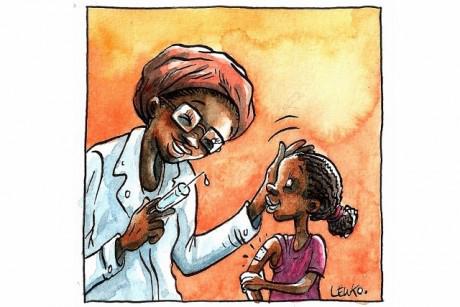
Each year, over 1.4 million children die from diseases that are preventable with readily available vaccines.
These diseases include measles, meningitis caused by Haemophilus influenzae type B (Hib), diphtheria, tetanus, pertussis (whooping cough), yellow fever, polio and hepatitis B.
New vaccines against other illnesses, such as pneumonia and diarrhoea caused by rotavirus, have been developed and are now more widely used.
Children who are immunized are protected from these dangerous diseases, which can often lead to disability or death. All children have the right to this protection.
Every girl and boy needs to be fully immunized. Early protection is critical.The immunizations in the child’s first year and into the second year are especially important.
It is also essential that pregnant women are immunized against tetanus to protect themselves as well as their newborns.
Although there has been progress in the past years in immunizing children, in 2008 nearly 24 million children — almost 20% of children born each year — did not get the routine immunizations scheduled for the first year of life.
Parents or other caregivers need to know why immunization is important, the recommended immunization schedule, and where their children can be immunized.
Parents or other caregivers need to know that it is safe to immunize a child who has a minor illness or a disability or is suffering from malnutrition.
What all families and communities should know about vaccination
1. Immunization is urgent. Every child should complete the recommended series of immunizations. Early protection is critical; the immunizations in the first year and into the second year are especially important. All parents or other caregivers should follow the advice of a trained health worker on when to complete the required immunizations.
2. Immunization protects against several dangerous diseases. A child who is not immunized is more likely to become sick, permanently disabled or undernourished, and could possibly die.
3. It is safe to immunize a child who has a minor illness or a disability or is malnourished.
4. All pregnant women and their newborns need to be protected against tetanus. Even if a woman was immunized earlier, she needs to check with a trained health worker for advice on tetanus toxoid immunization.
5. A new syringe must be used for every person being immunized.People should demand a new syringe for every vaccination.
6. Disease can spread quickly when people are crowded together. All children living in congested conditions, particularly in refugee or disaster situations, should be immunized immediately, especially against measles.
7. The vaccination card of a child (or an adult) should be presented to the health worker before every immunization.
Source: Pona Bana
 FR
FR EN
EN AR
AR








